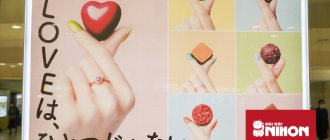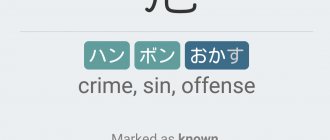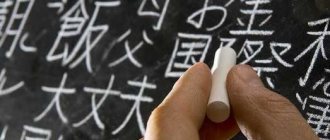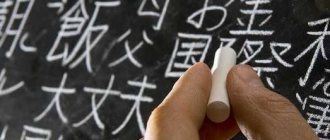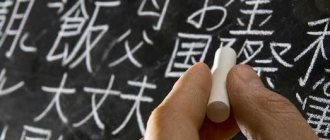If you want to express your feelings to your loved one in Japanese and say “I love you” to him, then we will help you with this. In this article, you will learn how to write and pronounce the phrases “I love you” and “I like you” in Japanese.
The Japanese have several characters for the word love:
- 愛(ai) and 恋(koi);
- 好き(suki) - “like”.
Therefore, first you should figure out what exactly you want to say, what meaning to put into the phrase.
The history of the translation of the phrase “I love you”
Natsume Soseki and Ftabatei Shimei, two names with which the history of the translation of the phrase “I love you” is associated. Before this, such a phrase did not exist in Japanese. Soseki, being an English teacher, translated this phrase from English. The background to this is that one of Soseki's students once translated the phrase "I love you" as 我君を愛す | utensils kimi o aisu (“I love you” - in Japanese). Soseki corrected the student that in Japan it is not customary to say 愛す | aisu (to love). Previously, it was not customary for the Japanese to express their feelings openly. He gave a more suitable translation, from his point of view: “(君と見ているから)月がきれいですね” (today (when you are with me) the moon is beautiful). This translation sounds more literary.
Another writer, Ftabatey Shimei, translated from Russian the phrase “I love you,” which was found in literary works of that time: “(あなたのためなら)死んでもいい” (for your sake) I can die. He, too, was looking for a suitable translation that would correspond to the indirect expression of feelings by the Japanese.
Also, instead of directly saying “I love you,” in Japan they often say “like you.” A sort of shyness of young people when expressing feelings. Despite the traditional indirectness of the Japanese in expressing their feelings in the past, the situation is now changing towards a more open and direct declaration of love, especially among young people. This is due to the significant penetration of Western culture into the land of the rising sun.
In order to understand how to say “I love you” in Japanese and to be correctly understood in our time, let's look at the options for hieroglyphs that mean the word “love”.
There are characters 愛(ai) and 恋(koi), as well as 好き(suki). What is the difference between them and how to use them?
好き(suki) is similar to the word “like”. What is meant here is not such a deep and serious feeling (like love), but a one-sided one, which arises for a certain time, is more an expression of passion, love. Quite often used in speech.
What are the features of slang?
As in the speech of any country, young people become “legislators”, and communication itself occurs mainly in a virtual environment. In order to facilitate correspondence and speed up the process of exchanging messages, almost every day someone invents a new word, abbreviation, abbreviation or metaphor.
In Chinese, there are several ways of word formation in colloquial speech and informal correspondence:
Literal meaning.
In this case, the word is emotionally colored in a positive or negative direction, as a result of which it acquires a different reading.
Semantic development.
For one reason or another, a word, in addition to its literal meaning, receives an additional meaning, which then takes root in speech.
Abbreviations.
Despite the fact that the sign system is very complex, there are many ways to reduce their use to a minimum.
Abbreviations.
They are created in the same way using icons that represent the first sounds of each word.
Borrowing.
The Chinese adopt many expressions from other languages: Korean, Japanese, English, German, French and even Russian.
Confusion of terms.
Sometimes it happens that one part of a word is borrowed, and another, characteristic of Chinese, is added to it.
How to practically confess your love in Japanese?
If you have been interested in Japan before, you may have heard about Japanese “confessions” or kokuhaku 告白. Building a relationship begins with such a declaration of love to the person you like, followed by an offer to meet. Most often this involves the following words: 好きです。付き合ってください。 (Ski desu. Tsukiattekudasai.) - “I love you! Please, let's meet." You may have heard something similar in Japanese dramas.
If there was no such recognition, then it is not even considered that you are dating. But after kokuhaku, going on a date with another man (woman) is considered cheating. It is interesting that in Japan, a person often expresses a declaration of love to a member of the opposite sex even without having previously communicated with him. For example, a Japanese man can confess his love and propose to date a girl whom he only observed, but did not communicate with. This can often be seen in Japanese melodramas, which may seem quite unusual to us. After all, in our culture it is customary to confess your love to a person whom you have known for some time and with whom you have communicated.
And at the same time, when the Japanese start dating, they do not consider this a test of feelings, but take everything quite seriously, expecting to get married in the future. In this regard, they are quite traditional and official marriages are also supported at the state level.
Now you know how to say I love you in Japanese without being misunderstood.
If you plan to live in Japan, translate from Japanese, or gain a deeper understanding of the nuances of declaring love in Japanese, then learning Japanese is a must. To do this, it is better to attend Japanese language classes or courses.
I like you
“I like you” is a phrase commonly used by the Japanese when declaring affection. It sounds like “Ski” and is written with the characters “好き”. This is a multifaceted phrase, applicable both for recognition to another person and for denoting a favorite object or phenomenon.
To say “I like you very much” in Japanese, the character for “large, significant” is added to these characters, which in this expression takes on the meaning “very”. It turns out to be “Daiski” or “大好き”. To enhance intonation they say “Dayskida”.
To understand the correct pronunciation of phrases, you can watch a video about confessions:
(好だよ as a confession . This phrase from everyday life does not reflect the strength of the speaker’s feelings, but shows their presence. It is inappropriate when expressing an attitude towards a friend. You can modify the expression by removing either of the last two syllables or both.
If a Japanese person speaks the Kansai dialect, he will declare his affection with the phrase "Skiyanen" (好きやねん). This is exactly what a native of Osaka will say.
You can confess without directly avoiding the word “ski.” One option is the phrase “Taisetsu” (大雪). Her translation: “You are very dear to me.”
Japanese has several expressions for talking about your feelings.
Where and for what are they used?
In the era of technology, digital codes in the Chinese language are used almost everywhere. Not only in friendly correspondence, chats and instant messengers - “convenient” icons have begun to penetrate into business correspondence to reduce time, simplify the communication process and speed up work on tasks.
First of all, numbers help out if there is a limit on the number of characters. For example, it is relevant for those who continue to write SMS or actively maintain an account on Twitter.
Despite the fact that there are a lot of Chinese characters on the Internet, on a global scale even the Chinese themselves find it inconvenient to use them all the time. This is another reason why digital codes are emerging not only as a language for computer programs, but also as a common, “linguistic” format. Numerical values can be found in website address bars, interactive buttons, slogans and instructions - also for brevity and ease of understanding.
In some ways, numbers are worth learning even for those just starting out with the language. Most of the communication and cultural acquisition currently takes place in a virtual environment, so the chance of encountering one of these expressions on the Internet is extremely high.
The Chinese language, like other languages of the world, has its own slang and simplifications. But only in Chinese can a set of numbers mean an entire expression. For example, 515206 reads "I don't love you anymore." And if you receive an SMS from a Chinese with the numbers 510170, do not rush to erase it, because you risk missing out on your destiny. After all, these numbers mean “I want to marry you.”
Before we talk about Chinese Internet slang and a funny way to exchange SMS messages, it is necessary to say a few words about the Chinese language itself.
Many of you were interested in what a Chinese keyboard looks like, how the Chinese type characters on a computer or phone. In fact, the button layout is no different - Latin letters, Arabic numbers.
If the computer had been invented at the beginning of the last century, its Chinese keyboard would have looked like this.
Keyboard with Zhuyin system
This system of typing characters is called “zhuyin”. It consists of 37 characters with which hieroglyphs are typed. Zhuyin was used in China at the beginning of the last century and is still used in Taiwan.
“Does your girl often text and say what to her friend? Don't trust her! - call on numerous services whose advertisements are littered with social networks, ICQ and even contextual advertising blocks. On every virtual corner of the Runet they offer to track any subscriber of cellular networks or allow you to read all his text messages. Are we really being watched? A “private correspondent” went to investigate.
The secret will not become apparent
But by the time computers and mobile phones appeared in China, another system had already existed for many years - pinyin, the Latin transcription of Chinese words.
True, not all letters and phrases are pronounced the same way as in the languages of the Romano-Germanic group. Misreading of Pinyin often irritates Sinologists. For example, the word "qigong" is written as qìgōng, but in some European countries it is read as "chigong", where the qi energy has been transformed into chi energy.
But let's get back to computers and keyboards. By the time most Chinese residents acquired computers and mobile phones, an excellent system for entering hieroglyphs had been developed, which later became also intelligent.
Intelligence lies in choosing the most common meanings of the sound of a word or even a whole sentence. After all, there are up to several dozen hieroglyphs per sound. For example, the word “I” is written as “wo,” but 17 more characters are also written in Pinyin, the difference in sound of which is determined by tone.
When you enter the word “I” (wo), the computer selects the most common (in this case correct) option, but also offers other hieroglyphs with the same sound
The computer shows the most common hieroglyph, but also offers a list of the others. If the user needs another hieroglyph, he selects it with the mouse and continues typing.
This is difficult only at first glance. The computer's intelligence is enough to change one hieroglyph to another while writing an entire sentence or expression. That is, if it initially suggested an incorrect hieroglyph, there is no need to rush to change it - by continuing to print the next words, the computer itself will orient itself and change it to the desired one in accordance with the rules of the language.
When typing the word “instant”, consisting of two hieroglyphs (shun jian), the computer first selects another hieroglyph with the same transcription (shun), but when entering “jian” it is corrected and gives the correct option
The same system is used in mobile phones. In more advanced models, you can write hieroglyphs directly on the screen with a sticker; they will be recognized and translated into printed text.
The widely advertised (though possibly unlicensed) Beeline lottery is positioned as a quiz game. The rules are not entirely clear, but the main thing is to maintain the participants’ desire to continue spending more than 50 rubles per SMS. Our private correspondent spent 1000 rubles so that you can be convinced: this quiz has a zero level of difficulty, but even a theoretical chance of winning is probably only available to those whose phone is paid for by the office or parents.
Beeline's anti-crisis scam
By the way, for free Sinologists like me, computerization has caused some loss of language. If I were to take an exam on Chinese knowledge, I would get a B in the “Dictation” category using a computer, but if I wrote it on paper, I would get a B. Because for a computer, the main thing is to know the pronunciation and rules of pinyin, and for paper, the main thing is to write all the features in a hieroglyph.
Despite the complexity of the language, the Chinese, like everyone else, are prone to simplifications. The same as, for example, “schas” instead of “now” in Russian, or “2you” instead of “to you” in English. This happens due to the use of other hieroglyphs, and due to the digital language, as well as due to Latin letters.
For example, FQ (from fènqīng) means angry youth, RT (from rú tí) is what in our slang means “subject” (a word given to the subject of the message, and it does not need to be duplicated in the message itself). The letters ZF (from zhèngfǔ) stand for government to bypass internet censorship filters. There are words that originated from the English language. For example, OL means “office hamsters” and comes from “office lady”.
The most complete version of the dictionary of Chinese Internet slang in Russian can be found here (the dictionary contains profanity).
But the digital language has become most widespread. The fact is that in Chinese, numbers sound the same as some words. The first digital combination that I came across on Chinese forums about seven years ago was “88”, which I initially took for some kind of peculiar spelling of an emoticon. But everything turned out to be much simpler.
Eight is pronounced "ba" in Chinese. When the Chinese write "88" it means "bye" (bye bye). The Chinese, who are especially sensitive to language, write “886”, where six is the ending bai bai le that does not mean anything, but is used for beauty and rhythm.
The game of words and numbers is used not only by ordinary users, but also by companies. For example, to make it easier to remember your phone number. So, the phone number for ordering food at McDonald's is 4008-517-517, but the last digits are pronounced “wu yao qi”, which is very similar to “wo yao chi” - “I’m hungry.” This type of play on words is also used in signs. For example, a bar called “519” sounds like “I want a drink.”
Even a foreigner who knows Chinese does not always understand such puns, since they contain an element of simplification and slight substitution of sound, as in the example with McDonald's. But the Chinese have already fully mastered digital slang and send each other SMS messages consisting only of numbers, which from the outside looks more like encryption.
Frequently used digital expressions:
521, wo ai ni - I love you (option 520 - respectful); 52094, wo ai ni dao si - I love you very much; 44, xiexie - thank you; 53550, wo xiang wen wen ni - I want to kiss you; 53880, wo xiang bao bao ni - I want to hug you; 53406, wo xiang si niya - I miss you very much; 066, ni lai le - are you there? 555, wu wu wu - to cry; 1414, yisi yisi - interesting; 56, wu liao - sad, boring; 065, yuanliang wo - excuse me; 58, wan an - good night; 526, wo e le - I'm hungry; 07868, ni chi bao le ba? - are you gorged? 753, chi wu can - I'm having lunch; 06537, ni re wo sheng qi - you made me angry; 07414, ni qu shishi - go try it; 0748, ni qu si ba - go to hell; 53782, wo xinqing bu hao - I'm in a bad mood; 08056, ni bu li wo - you are ignoring me; 08376, bie sheng qi le - don’t be angry; 1314, yīshēngyīshì - all life; 546, wo shu le - I lost; 77543, cai cai wo shi shei - guess who I am; 584, wo fa shi - I swear; 587, wo bao qian - I'm sorry; 596, wo zou le - I left; 729, qu he jiu - went to drink; 4456, su su hui lai - I'll be back soon; 777, ji ji ji - faster, in a hurry; 515206, wo yi bu ai ni le - I don’t love you anymore; 461, si nian ni - thinking about you; 809, bao ling qiu - bowling; 527496, wo yao qu shui jiao le - I want to sleep; 510170, wo yi ding yao qu ni - I want to marry you; 918, jia you ba - go ahead! Let's! 1711, yīxīnyīyì - with soul and heart; 1799, yiqi zou zou - let's go together; 70345, qing ni xiangxin wo - please believe me; 7087, qing ni bie zou - please don't go; 70885, qing ni ban ban wo - please help me; 5366, wo xiang liao liao - I want to talk.
The article used materials from the “Eastern Hemisphere” forum, the Sad Panda portal and the popular online publication about China “Magazeta”
SEND:
| Follow @chaskor |
Ai
Well, the third word that we will consider is ai. Its meaning is love, but can be used not only to express strong romantic affection or platonic feelings. Of course, it can also be used to declare love. True, more often in such cases it is used in conjunction with the verb - aijo. In this version, the sentence will carry a semantic load associated with the concept of family love, platonic feelings and, of course, a very strong feeling - love. In this case, the combination “ai suru” is used.
So why, then, isn't the preferred phrase for declaring love "suki desu"?
This is because it is not used to express serious devotional feelings. It can be used to express feelings about a puppy, for example, or to say how much you love nature or vacations.
Ai suru is the first, but very significant step beyond friendship, indicating an emerging feeling of deep platonic love. As soon as people’s feelings move to a qualitatively new stage, close to the creation of a couple, “ai suru” can be used.
Language school students often make a mistake in using this word. So you need to remember, if you want to say “I love you” to someone, you need to change the verb “suru” to “shiteiru”. This change in the verb indicates that your feelings not only exist, but are getting stronger every day.
What does the Chinese decoding of numbers look like?
Native speakers playfully introduce vocabulary structures “disguised” as numbers, and we can only guess what the interlocutor meant? Even advanced experts sometimes find it difficult to understand what is happening, because they are accustomed to the literal meaning, but here, not only are most expressions used figuratively, but also in the format of Chinese slang in numbers.
But for quick typing on a computer keyboard (especially if you only have Russian and Latin layouts), mastering the “language” of Chinese numbers will indeed be the easiest.
What numbers and numbers are used?
Almost everything. There are constructions from 0 to 9 and each number begins with about several dozen different phrases and expressions.
Most often, the point is the consonance of the names of the numerals themselves with other words. The more similar a sound is to a word or even a group of words, the more likely it is to be used to represent it in writing.
For example, in this case, the Chinese make concessions even for the number “four” that they strongly dislike, which with its sound reminds them of the pronunciation of the hieroglyph “death” or “to die”, and still use it when abbreviating phrases. If you change the sound a little, then “four” will sound like “shi”, which means “to be” or “to appear”. The popularity of the sound immediately increases.
Most of the designs begin with the numbers “0”, “1”, “2”, “3”, “5”, “7” and “8”.
The popularity of the number “five” can also be explained quite simply: it is pronounced “wǔ”, which is very similar to “wǒ”, the pronoun “I” with which most sentences begin.


